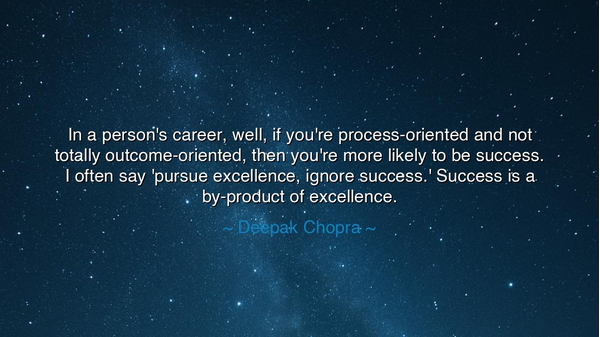
In a person's career, well, if you're process-oriented and not
In a person's career, well, if you're process-oriented and not totally outcome-oriented, then you're more likely to be success. I often say 'pursue excellence, ignore success.' Success is a by-product of excellence.






Hear the words of Deepak Chopra, who declared with serene clarity: “In a person’s career, well, if you’re process-oriented and not totally outcome-oriented, then you’re more likely to be success. I often say ‘pursue excellence, ignore success.’ Success is a by-product of excellence.” These words, though spoken in our age, carry the eternal resonance of the ancients, for they remind us of the difference between the shallow crown of victory and the deeper treasure of mastery.
To be outcome-oriented is to fix one’s eyes only on the harvest, measuring life by numbers, trophies, and applause. But to be process-oriented is to love the planting, the watering, the tilling of the soil. It is to cherish the journey more than the destination, the discipline more than the reward. Chopra teaches us that true success is not seized by chasing it, but received when one gives themselves fully to the craft with heart and devotion.
Consider the story of Michelangelo, who labored four years upon the ceiling of the Sistine Chapel. Had he been outcome-driven, he might have rushed, cutting corners to finish quickly and earn his fee. But Michelangelo was consumed by the process—by the love of color, form, and detail. He even painted sections the viewer could scarcely see, for he knew that excellence demands nothing less than fullness. Centuries later, his name endures, not because he chased fame, but because he pursued excellence, and fame became its shadow.
The same truth shines in the life of Mahatma Gandhi. He did not set out to win worldly honors or wield political power. He set out simply to live truthfully, to practice nonviolence, to pursue spiritual and moral excellence in every act. And yet, because of this devotion to principle, he became the voice of a nation and a beacon to the world. His success was never his aim, but it followed him like a faithful companion, because excellence is the soil in which true success must grow.
The lesson, O children of tomorrow, is this: ignore success and pursue excellence. If you chase success, it will flee like a shadow in the sun; but if you fix your gaze on the work, the discipline, and the virtue of your craft, success will find you in its own time. Do not seek applause, seek mastery. Do not hunger for the crown, hunger for the fire of greatness within yourself. For applause fades, but excellence endures.
Practically, this means to shift your focus. In your work, ask not, “Will this make me rich or famous?” but “Is this my best? Is this true to my highest standard?” In study, ask not, “Will this earn me a grade?” but “Have I gained understanding?” In love and service, ask not, “What will I gain?” but “Have I given sincerely?” Train your heart to love the process, and the outcome will take care of itself.
Thus, the wisdom of Deepak Chopra is revealed: “Pursue excellence, ignore success. Success is a by-product of excellence.” Let these words be etched into your soul. For the man who seeks only outcomes will be empty even in victory, but the man who gives himself to the process will be full even in struggle. And in the fullness of time, his life will shine—not because he sought success, but because he lived in the light of excellence.






AAdministratorAdministrator
Welcome, honored guests. Please leave a comment, we will respond soon